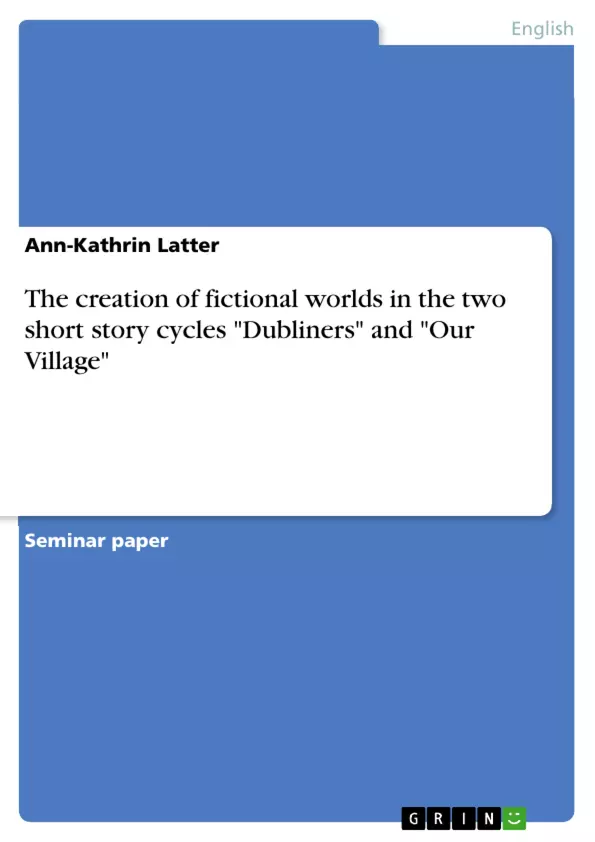This term paper seeks to explore the creation of fictional worlds in the two short story cycles Dubliners and Our Village. Naturally, it requires a lot of effort to analyze world-making in a literary text: there are so many criteria that need to be examined. But despite these difficulties, I still venture to take a deeper look at the different modes of fictionality, because I believe that such an inquiry will help us discover the operation principles of world-making. And due to their collaged variety of world views, short story cycles might be the ideal research objects if we want to determine what makes fictional worlds credible.
In order to reach this goal, I will first introduce my own theory and methodology of world-making that will focus on a large set of criteria at the endo-narrative, exo-narrative, and meta-narrative levels. The described criteria will then be set to use in the analysis of the two short story cycles. The main points for examination during this process will be mood, emotionality, rhetoric and narrative strategies, since I regard them as the most fundamental aspects that contribute to the credibility of a story world. Thus, I hope to evince both the elements that might make a fictional world real/concrete and any eventual interferences which may be detrimental to the credibility of the stories.
Inhaltsverzeichnis (Table of Contents)
- Introduction
- The theory and methodology of world-making
- The endo-narrative level
- The exo-narrative level
- The meta-narrative level
- A short overview of the analytical criteria used in this paper.
- Narrative modes in James Joyce's Dubliners
- Using words to mirror a city
- Of narrative composition and deformation…
- Symbolism and allegory in Dubliners
- Mary Russell Mitford's Our Village as provincial fiction
- A collaged variety of the countryside
- The symbolism of place
- A Utopian world
- Conclusion
Zielsetzung und Themenschwerpunkte (Objectives and Key Themes)
This paper aims to explore the creation of fictional worlds in the two short story cycles Dubliners and Our Village. The paper proposes a new theory and methodology for analyzing world-making in literary texts, focusing on a broad set of criteria at the endo-narrative, exo-narrative, and meta-narrative levels. The analysis will investigate the impact of mood, emotionality, rhetoric, and narrative strategies on the credibility of the story world.
- The concept of world-making in literary texts.
- The role of narrative strategies and rhetorical devices in creating fictional worlds.
- The relationship between the endo-narrative, exo-narrative, and meta-narrative levels of a story world.
- The impact of mood, emotionality, and narrative modes on the credibility of fictional worlds.
- The significance of the two short story cycles Dubliners and Our Village as case studies for analyzing world-making.
Zusammenfassung der Kapitel (Chapter Summaries)
The introduction sets the stage for the paper by discussing the concept of world-making and its relevance to literature. It highlights the importance of storytelling in shaping our understanding of ourselves and the world. The paper proposes a new approach to world-making analysis, incorporating existing methodologies but expanding on them by exploring a wider range of variables at three distinct levels: the endo-narrative, exo-narrative, and meta-narrative.
The second chapter introduces the theory and methodology of world-making in detail. It outlines the three layers or planes of examination: the endo-narrative, exo-narrative, and meta-narrative levels. The chapter explains the significance of each level and the variables that will be considered within each. The analysis will focus on the elements that contribute to the credibility of a story world, particularly mood, emotionality, rhetoric, and narrative strategies.
Chapter three focuses on the narrative modes employed in James Joyce's Dubliners. It examines how Joyce uses words to mirror the city of Dublin, exploring the techniques of narrative composition and deformation. The chapter also delves into the symbolism and allegory present in the collection.
Chapter four explores Mary Russell Mitford's Our Village as an example of provincial fiction. It analyzes the collaged variety of the countryside depicted in the collection and investigates the symbolism of place. The chapter also considers the presence of Utopian themes in Our Village.
Schlüsselwörter (Keywords)
This paper focuses on world-making in literary texts, particularly in the context of the short story cycles Dubliners and Our Village. Key concepts include: narrative strategies, rhetoric, symbolism, allegory, mood, emotionality, endo-narrative, exo-narrative, meta-narrative, and provincial fiction. The analysis will examine the relationship between these elements and their impact on the credibility and immersive qualities of fictional worlds.
Frequently Asked Questions
How do short story cycles contribute to the creation of fictional worlds?
Short story cycles like "Dubliners" and "Our Village" offer a collaged variety of viewpoints, making them ideal for analyzing how credible and immersive story worlds are built through interconnected narratives.
What are the three levels of world-making analysis used in this paper?
The paper examines world-making at the endo-narrative (internal story elements), exo-narrative (external context), and meta-narrative (commentary on the storytelling itself) levels.
How does James Joyce use words to mirror the city in "Dubliners"?
Joyce employs specific narrative modes, symbolism, and techniques of "composition and deformation" to create a realistic yet allegorical representation of Dublin.
What makes Mary Russell Mitford's "Our Village" a Utopian world?
The analysis explores how Mitford uses the symbolism of place and a specific emotionality to depict a provincial countryside that often takes on idealistic or Utopian qualities.
What elements contribute most to the credibility of a fictional world?
According to the paper, mood, emotionality, rhetoric, and specific narrative strategies are the fundamental aspects that make a fictional world feel concrete and real to the reader.
- Quote paper
- Ann-Kathrin Latter (Author), 2019, The creation of fictional worlds in the two short story cycles "Dubliners" and "Our Village", Munich, GRIN Verlag, https://www.grin.com/document/490063



